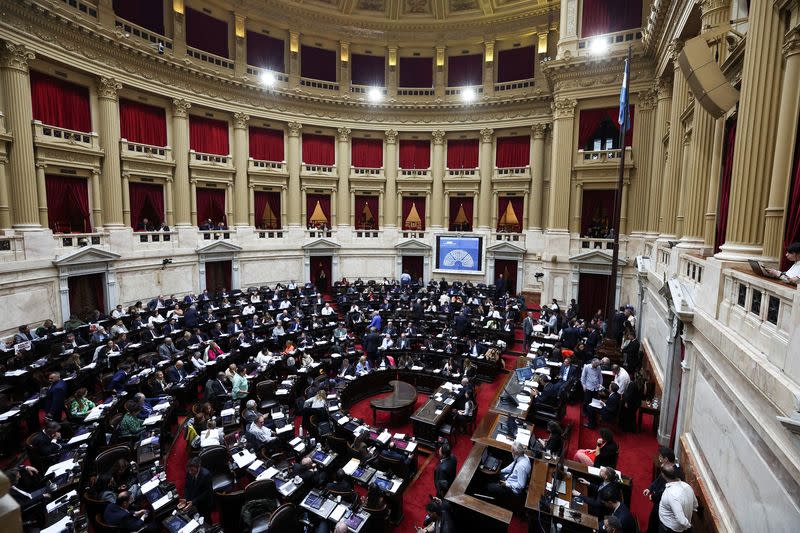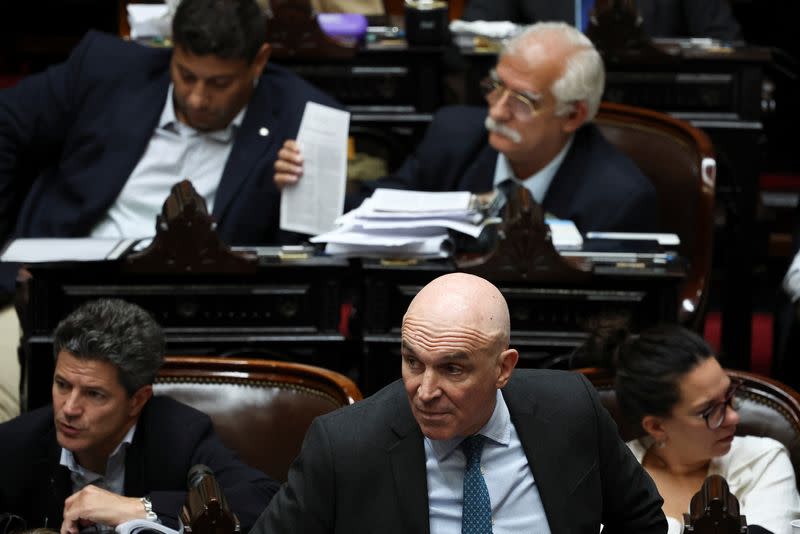Argentina lawmakers boost Milei, markets with reform bill backing
- Oops!Something went wrong.Please try again later.
By Nicolás Misculin and Jorge Otaola
BUENOS AIRES (Reuters) -Argentina's lower house of Congress gave President Javier Milei a boost on Tuesday by approving his sweeping reform bill ahead of a final Senate vote and backing articles related to privatizing state bodies and labour reform.
The support, even as voting on the hundreds of individual articles continued, cheered markets that have rallied on hopes that Milei's reforms and tough austerity will help erase a deep fiscal deficit and slash inflation now nearing 300%.
"The most relevant thing for markets is that the government is managing to negotiate with the opposition," local financial consultancy Adcap said in a note, though it cautioned that the bill still faced a second and final vote in the upper house.
"Now we need to see if this works in the Senate."
The S&P Merval stock index rose nearly 2% on Tuesday, while bonds that have soared from a low base since Milei took office in mid-December gained some 0.6%.
Milei, a libertarian economist who won a shock election last year pledging to shake up the country, hopes that the bill, once termed the "omnibus bill" but since significantly streamlined, will rev up the embattled economy and tamp down inflation.
"This is a fundamental first step to get Argentina out of the quagmire that it has been in over the last few decades," Milei posted on X after the vote.
While his party only has a minority in Congress, Milei has won support from allies in the lower house after months of negotiations and concessions on the reform package, which was rejected at a previous vote in February.
"This support will allow Milei to govern," conservative lower house lawmaker Victoria Borrego told Reuters, referring to the president's ability to rally political support.
SENATE OPPOSITION
The reform package, which is expected to face stronger opposition in the Senate, would give the executive the power to restructure or privatise public bodies, reduce red tape to attract investments and tweak labour regulations.
Lawmakers also voted to approve in general a separate fiscal package that would cut tax rates on personal assets but raise taxes on high-income earners, a proposal that has drawn strong opposition from local unions including in the key grains sector.
That fiscal reform bill - part of Milei's push to achieve a "zero deficit" this year - also faces a detailed vote before it could move up to the Senate.
Argentina is suffering annual inflation nearing 300%, which Milei aims to bring down with painful austerity, though that has hit consumption, manufacturing and economic activity. Poverty is also rising as inflation saps real incomes.
"Voting for this law is legitimising a project that does not solve the problems of Argentines, neither poverty nor inflation," Peronist opposition member Santiago Cafiero, a minister in the previous government, wrote on X.
(Reporting by Nicolas Misculin; Additional reporting by Jorge Otaola; Writing by Gabriel Araujo; Editing by Andrew Heavens, Gareth Jones and Nick Zieminski)





